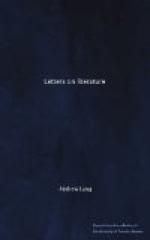What an interesting tract might be written by any one who could remember, and honestly describe, the impressions that the same books have made on him at different ages! There is Longfellow, for example. I have not read much in him for twenty years. I take him up to-day, and what a flood of memories his music brings with it! To me it is like a sad autumn wind blowing over the woods, blowing over the empty fields, bringing the scents of October, the song of a belated bird, and here and there a red leaf from the tree. There is that autumnal sense of things fair and far behind, in his poetry, or, if it is not there, his poetry stirs it in our forsaken lodges of the past. Yes, it comes to one out of one’s boyhood; it breathes of a world very vaguely realized—a world of imitative sentiments and forebodings of hours to come. Perhaps Longfellow first woke me to that later sense of what poetry means, which comes with early manhood.
Before, one had been content, I am still content, with Scott in his battle pieces; with the ballads of the Border. Longfellow had a touch of reflection you do not find, of course, in battle poems, in a boy’s favourites, such as “Of Nelson and the North,” or “Ye Mariners of England.”
His moral reflections may seem obvious now, and trite; they were neither when one was fifteen. To read the “Voices of the Night,” in particular—those early pieces—is to be back at school again, on a Sunday, reading all alone on a summer’s day, high in some tree, with a wide prospect of gardens and fields.
There is that mysterious note in the tone and measure which one first found in Longfellow, which has since reached our ears more richly and fully in Keats, in Coleridge, in Tennyson. Take, for example,
“The welcome, the thrice prayed
for, the most fair,
The best-beloved
Night!”
Is not that version of Euripides exquisite—does it not seem exquisite still, though this is not the quality you expect chiefly from Longfellow, though you rather look to him for honest human matter than for an indefinable beauty of manner?
I believe it is the manner, after all, of the “Psalm of Life” that has made it so strangely popular. People tell us, excellent people, that it is “as good as a sermon,” that they value it for this reason, that its lesson has strengthened the hearts of men in our difficult life. They say so, and they think so: but the poem is not nearly as good as a sermon; it is not even coherent. But it really has an original cadence of its own, with its double rhymes; and the pleasure of this cadence has combined, with a belief that they are being edified, to make readers out of number consider the “Psalms of Life” a masterpiece. You—my learned prosodist and student of Browning and Shelley—will agree with me that it is not a masterpiece. But I doubt if you have enough of the experience brought by years to tolerate the opposite opinion, as your elders can.




